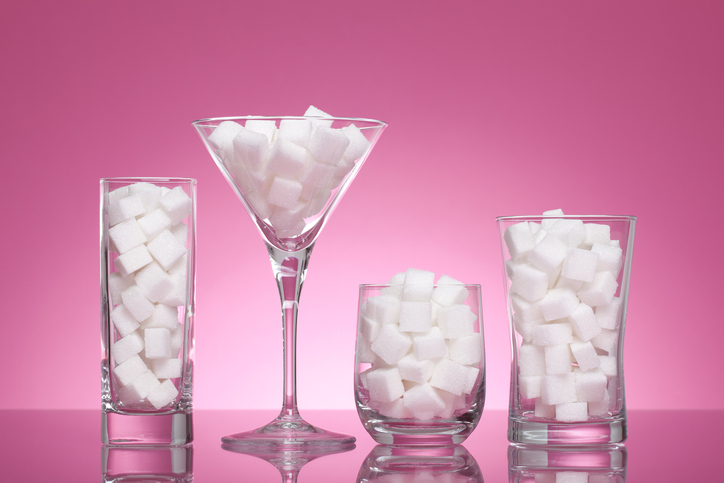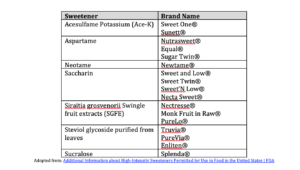
When we live with diabetes, our healthcare providers tell us to avoid added sugars. This recommendation is made for a variety of reasons, including maintaining a healthy body weight, avoiding glucose spikes, and protecting our heart health. Since we avoid sugar, we often then reach for an alternative sweetener. Alternative sweeteners go by many names including non-nutritive sweeteners, sugar substitutes, and artificial sweeteners. The questions I often hear from patients are, aren’t they bad for you, and isn’t real sugar better? So in this posting, I wanted to explore a few questions regarding sugar substitutes to provide you with more information.
What Are Artificial Sweeteners?
Non-nutritive sweeteners are made from different substances and/or plants that are many times sweeter compared to table sugar, and provide little to no calories. The Food and Drug Administration (FDA) calls them “high intensity sweeteners”. The first sweetener (saccharin) was founded in 1879. All sweeteners have been approved by the FDA under one of two primary regulations: food additives permitted for direct addition to food for human consumption or generally recognized as safe (GRAS notices). You can review which sweeteners are permitted under which FDA regulation at U.S. Food and Drug Administration (fda.gov).
What Are the Common Non-Nutritive Sweeteners Used in U.S. Markets?
Non-nutritive sweeteners have expanded on the market since the 1970s. When I was a kid, I remember there were only the pink and blue artificial sugar packs. Now there are pink, blue, yellow, green, and brown! Introducing the era with a rainbow of sweeteners!
Below is a list of the FDA approved sweeteners you can find on the market. Each sweetener has different sweetness intensities (one is 20,000x more sweet than sugar!) and which food/beverage categories it is permitted for use in. Plus, some are heat stable and others are not. This is why you see and taste differences among products.

Are These Artificial Sweeteners Safe?
YES, these sweeteners are considered safe by the FDA. In the 1970s, saccharin was linked to the development of bladder cancer in rats, resulting in Congress evaluating saccharin and other sugar substitutes thoroughly. Since then, studies have demonstrated that saccharin is safe for human consumption and has been removed from the list of potential carcinogens. Each type of sweetener has undergone 90+ studies evaluating their safety.
The Joint FAO/World Health Organization Expert Committee on Food Additives have established Acceptable Daily Intake (ADI) for each sweetener based on body weight. These limits range from 0.3-50mg/kg/day depending on the type of sweetener. Those most common ADIs are as follows:
- Aspartame: 50mg/kg/day
- Saccharin: 15mg/kg/day
- Steviol: 4mg/kg/day
- Sucralose: 5mg/kg/day
There is no ADI for SGFE.
What about Sugar Alcohols?
Sugar alcohols are different than high intensity sweeteners since they are NOT sweeter than sugar (25-100% as sweet as sugar to be exact) and they DO contain calories. Sugar alcohols are derived from sugar. Sugar alcohols are slowly and incompletely absorbed which allows them to provide a sweet taste, with fever calories compared to sugar. Since sugar alcohols are not completely absorbed, some types can cause gas, bloating, and diarrhea. Sugar alcohols are found in small amounts naturally in fruit and vegetables and also can be added during food processing. Examples of added sugar alcohols are sorbitol, mannitol, erythritol, and xylitol.
Putting It Together
So, what does this all mean when we are living with diabetes?? Well, it means both sugar substitutes and sugar alcohols will affect blood glucose levels less than regular sugar. In general, all artificial sweeteners will NOT lead to glucose spikes or provide calories. Comparatively, blood glucose response will VARY depending the type of sugar alcohol. Of the many sugar alcohols on the market, erythritol and xylitol, have been found in studies to have minimal effect on blood glucose.
The Standards of Diabetes Care from 2021 state that using non-nutritive sweeteners will provide less calories and carbohydrates if replacing regular sugar. BUT the long-term goal should be water consumption over artificially sweetened beverages. The Standards of Care also explain that there is mixed evidence (it may help or it may not help) when using non-nutritive sweeteners for weight loss.
Lastly, the Standards of Diabetes Care do not go into specific guidance about sugar alcohols. Previously, the “Choose Your Foods: Food Lists for Diabetes” booklet written by the American Diabetes Association and the Academy of Nutrition and Dietetics, explained that when carb counting, half the amount of sugar alcohol should be subtracted from the total carb. Currently, they no longer give specific instructions on how to carb count sugar alcohols. Instead they support monitoring your blood glucose response. This is likely due to the additional types of sugar alcohols on the market, and knowing that all sugar alcohols are absorbed differently.
So What Do You Think, Are Sugar Substitutes Better Than Real Sugar?
Well, long story short – YES, as a dietitian and a person living with diabetes, I can say that sugar substitutes are a better alternative compared to regular sugar to avoid glucose spikes and empty calories. However, over consumption of ANY processed foods isn’t the healthiest way to live. I would encourage you and your loved ones to be mindful of how much artificial sugar and/or sugar alcohols are taken in daily. When you are enjoying them, they all taste different, so the best kind to eat/drink will depend on which tastes best to you. You can always explore options for sweetening foods/drinks with whole, unprocessed foods like fruit, cinnamon, spices, and root vegetables. Of course, a small amount of regular sugar can be included in a healthy diet too. When using non-nutritive sweeteners, my go-tos are monk fruit and Splenda. I sometimes bake with Swerve (erythritol) when I want to make a recipe lower in carb. Comment below and share with others – what are your go-to non-nutritive sweeteners?


I use stevia but don’t know if its safer than the others I would like to know
Hi Margaret, We reached out to Dana, and here is her reply:
All the artificial sweeteners listed above are safe, so that includes Stevia! It is not considered any more or less safe since they all meet FDA testing. The upper limit for consumption is <4mg/kg/day. With that being said, some Stevia sweeteners are “bulked” up by adding sugar alcohols. So, I would also just want to make sure the brand you use, doesn’t cause any gas or bloating.
Can you update this to include Allulose? I’m finding this to be a fantastic non-nutritive sweetener and there are even studies showing it reduces blood glucose. It is an epimer of fructose. Thanks.
Hi Sarah,
Thank you for your question – here’s Dana’s reply:
Yes, allulose is a great sugar substitute! It has 0.4 calories per gram and does not metabolize into glucose, so it will have little effect on blood glucose too! Many people like allulose since it can be baked and frozen like regular sugar for lower carb/sugar sweets.
I’d love to know what the product is that has allulose?
Bocha Sweet is even better than Swerve and Lakanto Monkfruit.
I seriously doubt that all substitutes listed here are safe, for example, aspartame gives many people extremely painful headaches and it’s not due to allergies, in addition sugar alcohols cause IBS and diarrhea, the older sweeteners such as saccharin are made from variations of Chromium and one of these is made from adding Chlorine molecules to the existing molecule to make it taste sweet after bonding. The simple fact is there have not been any independent double blind studies on the long term effects of these artificial sweeteners (not all are artificial for clarity).
Thanks for the information. These sweeteners are very much needed and appreciated by people with diabetes. They may have side effects in some individuals, but not in others.